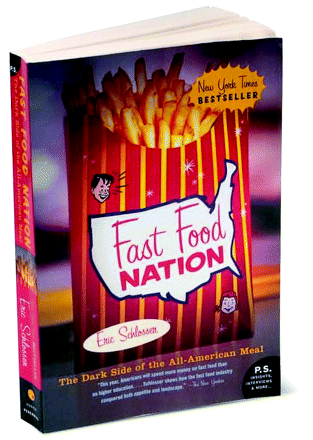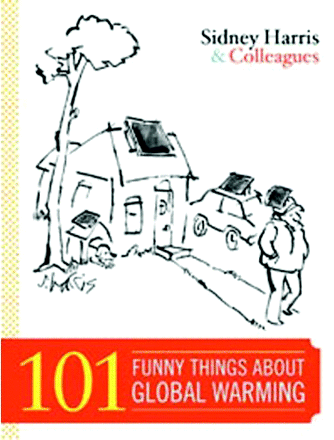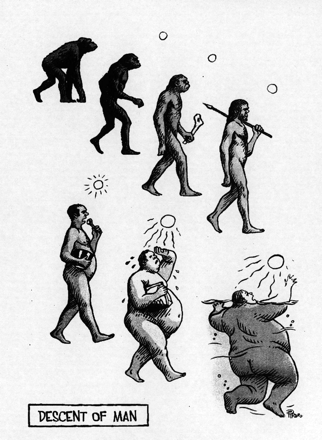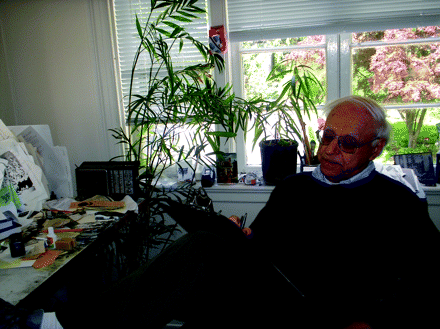Eat This
- John Nelson, PhD, Associate Editor
Fast Food Nation

Eric Schlosser, New York: Harper Perennial, 2005, 416 pages. $14.95, ISBN-13: 978-0060838584
“corporation, n. an ingenious device for obtaining individual profit without individual responsibility.”
—Ambrose Bierce
The Devil’s Dictionary
Entrepreneurs are an unusual lot. Outsiders often, mavericks nearly always, these are the individuals who see a way not seen by others who came before or are willing to trust their own instincts (and are blessed with a cast-iron stomach when it comes to doubts and adversity). Entrepreneurs are as often lauded for their singular ability and fortitude as they are vilified as destroyers of the environment or heartless businessmen who care not for the plight and dignity of the worker. Vilification, however, does not arise only from righteous indignation. It is most often tainted with envy, sometimes with jealousy.
In 1905, Upton Sinclair wrote the muckraking masterpiece The Jungle, a fictionalized account of the lives of several workers he interviewed at the Chicago stockyards. Many of the stories he heard were rolled into the experiences and soul-crushing blows endured by his protagonist, Jurgis Rudkus. Fleeing Lithuania for something better in America, Rudkus and his wide-eyed family land in Chicago with no contacts and desperate for shelter and jobs. Lucky to land a job based on his physical prowess, Jurgis is walked through one of the big cattle processing plants, as a sort of job orientation, where he views the speed, necessary efficiency, and danger with which the men and sometimes women conduct themselves to meet quotas of carcass delivery and meat processing. Workers are injured frequently, sometimes killed on the job. One of the most memorable passages from the novel describes a worker’s fall into a lard processing vat. When the vat is finally drained days later, there’s not enough left of him to bother to tell the family about, let alone bury. In the foreword to a new edition of The Jungle, Eric Schlosser mentions Sinclair’s disappointment at not being able improve the working conditions of the workers who had no say or support. Still, quality standards of food production were improved in response to the novel’s publication, even in the absence of union support. Theodore Roosevelt’s interest in busting trusts led to greater accountability of the meat packing industry. Schlosser also states that antitrust legislation led to thriving competition, so that what had been a fifty-five percent market control by the five largest meatpacking companies at the height of the trust era decreased, by 1970, to a twenty percent share by the four largest companies. This balance was upset by the McBoom. Fast food chains grew in popularity, and it became paramount that consistency of taste could be relied upon. A burger bought in Tehachapi had better taste exacly the same as a burger bought in Tallahassee. Thus, frozen hamburger meat was purchased in much larger volume from meat suppliers, encouraging the consolidation of large meatpacking companies again and driving out competition.

“For years some of the most questionable ground beef in the United States was purchased by the USDA—and then distributed to
school cafeterias throughout the country. Throughout the 1980s and 1990s, the USDA chose meat suppliers for its National School
Lunch Program on the basis of the lowest price, without imposing additional food safety requirements. The cheapest ground
beef was not only the most likely to be contaminated with pathogens, but also the most likely to contain pieces of spinal
cord, bone, and gristle left behind by the Automated Meat Recovery Systems (contraptions that squeeze the last shreds of meat
off the bones).”
In this renewed atmosphere of meat trusts and legislation to protect the industry, Eric Schlosser has written Fast Food Nation, a fascinating book that exposes the myth of meat-packing company accountability. Part expose on the additives incorporated into food to make it taste like it should, and part documentation of the tribulations of the migrant worker (legal and illegal), Fast Food Nation is a Jungle for the twenty-first century. What Schlosser adds is a large section devoted to the biographies of the men who were determined to find a way to personal wealth through the stomach of America. In this, Schlosser neither damns nor praises. He provides accounts of the beginnings of Ray Kroc (the visionary man behind the growth of the McDonald’s giant), Carl Karcher (Carl’s Jr.), and others, including J. R. Simplot, who started with nothing and kept parlaying what little he had into something bigger. Fueled with great ideas, Simplot has become truly an inspiration to all who dream of becoming a successful entrepreneur. The culmination of his extraordinary accomplishments? Simplot owns and leases more land than that encompassed by Delaware (1954 sq. mi.)!
Other parts of the book make the blood run cold: the sophisticated marketing that uses child psychology—there are several methods by which children might succeed in getting their parents to buy Happy Meals; the outbreaks of E. coli (O157:H7) and Salmonella in tainted ground beef; the legislation forced through Congress by right-wing politicians to limit the ability of OSHA to inspect plants; the fact that the USDA can only suggest that a plant shut down when an outbreak is traced back to that specific plant; the harrowing death of a small child because of infected meat; and the adding of blood and meat to the feed of cattle. There are a number of lax systems that make one wonder about the quality of meat inspection when it comes to Mad Cow disease and its human equivalent, variant Creutzfeld-Jakob disease. Lastly, there is the pathetic story of Kenny Dobbins. Dobbins worked for a meatpacking plant in Greeley, CO, and seemed to trust his bosses implicity. He was always against unionization, always worked the lowest jobs when called upon to do so; performed tasks without proper equipment; was severely injured several times; all for naught when his employer let him go…as he was convalescing from a serious job injury. How did he find out? The checks he wrote for payment of his health insurance premiums kept getting returned by the post office, so he called his employer. After several calls, he was finally told he was no longer employed there.
One theme that runs through the book is the disavowal of industrial accountability and culpability: with ever-vigilant congressmen who have worked to weaken the governmental agencies that oversee the safety of the meat industry; with CEOs deflecting blame; with apologists who warn of the many lawsuits that would ensue in our litigious society every time even a little contamination made its way to the market place.
Fast Food Nation is a few years old now but is as important as ever. We have been treated to newer editions of Thomas Friedman’s The World is Flat and of Steven Levitt’s Freakonomics. What we truly need is an update of Fast Food Nation. As turning a light on causes cockroaches to scurry and keep them at bay, further editions of Fast Food Nation and other muckraking books might begin to make a difference again in food quality and worker safety.
101 Funny Things About Global Warming

Sidney Harris, New York: Bloomsbury USA, 2008, 112 pages. $13.95, ISBN-13: 978-1596914827
Humor is serious business. 101 Funny Things About Global Warming, by Sidney Harris and colleagues, tackles a serious topic and mines humor from it. Harris, who was interviewed on National Public Radio’s Science Friday about his book, has said it “apparently is the only book of humor on the subject of global warming.” As readers of Molecular Interventions will know, we showcase Harris’s talent in nearly every issue, in the Outliers department. Many of the book’s cartoons take a situation associated with global warming and exaggerate it to an absurd In others, several well-known politicians are lampooned. These politicians are hoist by their own petard as Harris places a quote uttered by them underneath the caricature. Harris’s 101 Funny Things would make a good gift for a friend whose sense of humor runs the gamut from silly to wry.

- © American Society for Pharmacology and Experimental Theraputics 2008




